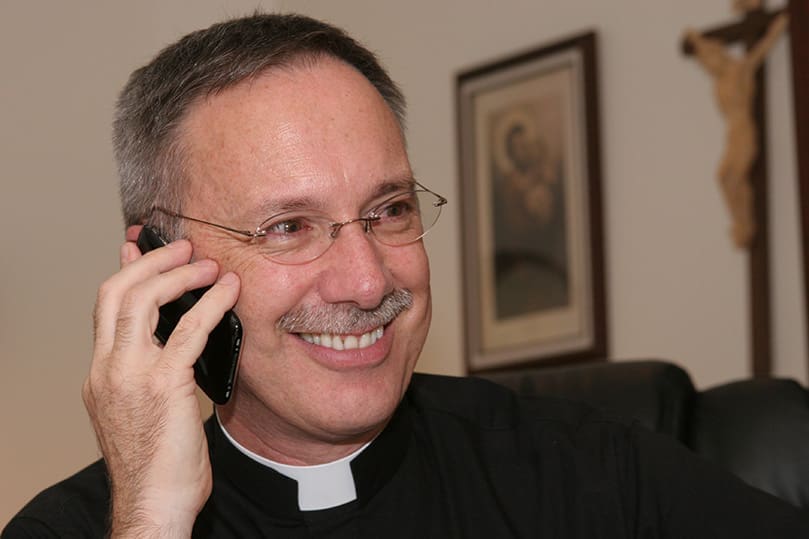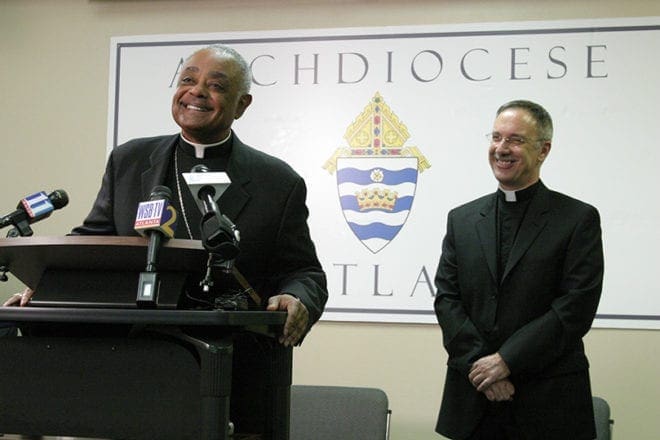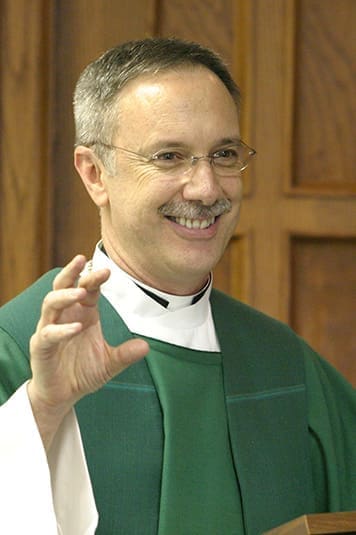 Photo By Michael Alexander
Photo By Michael AlexanderAtlanta
Msgr. Zarama Named Atlanta Auxiliary Bishop
By STEPHEN O’KANE and ANDREW NELSON, Staff Writers | Published August 6, 2009
Archbishop Wilton D. Gregory led a press conference the morning of Monday, July 27, joyfully announcing Pope Benedict XVI’s appointment of Msgr. Luis R. Zarama as auxiliary bishop of the Archdiocese of Atlanta.
The formal announcement was made in Washington the same day by Archbishop Pietro Sambi, apostolic nuncio to the United States.
Bishop-elect Zarama, 50, will be only the second auxiliary bishop of Atlanta in its history. His ordination on Tuesday, Sept. 29, at the Cathedral of Christ the King will be the first time a bishop has been ordained there. He is a native of Colombia.
Archbishop Gregory said at the press conference that he was grateful to Pope Benedict for the appointment that will help him care for the spiritual needs of the growing archdiocese.

Archbishop Wilton D. Gregory answers questions from the media about the role of an auxiliary bishop as bishop-elect Luis Zarama stands in the background. Photo By Michael Alexander
“I am deeply grateful to His Holiness for this appointment, which so favorably responds to the growing pastoral needs of our burgeoning local church,” said the archbishop in a statement.
He also expressed his belief that the appointment honors all of the priests serving in the archdiocese.
“The Holy Father’s selection of Msgr. Zarama from among our own generous and zealous priests is an affirmation not only of the gifts of this very fine priest, but of the quality of all of the priests who serve us,” he said.
Archbishop Gregory noted that Catholics in North Georgia are nearing 800,000 strong, a “staggering” increase from the 22,000 Catholics that were part of the diocese when it was created in 1956 from the Diocese of Savannah.
The archbishop said that the continued growth of the archdiocese is the main reason for the appointment of an auxiliary bishop, a position usually utilized when the diocese is so extensive that it requires more than one bishop to administer diocesan responsibilities.
“In those circumstances, the Holy Father provides the local ordinary with an assistant in the episcopal ministry to share with him those responsibilities that require, or really call for, the presence of a bishop,” he explained.
After sharing some of the surprising statistics regarding North Georgia’s Catholic growth, a smiling Archbishop Gregory said, “Quite frankly, I could really use some help.”

Monsignor Luis Zarama preaches during the noon Mass at the Catholic Center, just two hours after a press conference naming him the new auxiliary bishop for the Archdiocese of Atlanta. Photo By Michael Alexander
Bishop-elect Zarama said, “The first challenge is to help the archbishop.”
But “how we can reach (Catholics) … with a message of love” is also one of the most important tasks, he said.
“I am very deeply grateful to the Holy Father,” he said. He also thanked the archbishop for his support throughout the years.
He also addressed his colleagues at the Catholic Center, fellow priests and former parishioners who, according to him, made him into the man and priest he is today.
“I hope I can continue working with you, to have your support, and to continue to be able to serve God in this new appointment,” he said.
Bishop-elect Zarama will become the second auxiliary bishop in the 53-year history of the archdiocese. The late Cardinal Joseph Bernardin of Chicago began his episcopal service in 1966 as an auxiliary bishop in Atlanta under Archbishop Paul J. Hallinan, during the early years of the budding archdiocese when Archbishop Hallinan fell ill.
Born Nov. 28, 1958, in Pasto, Colombia, to parents Rafael and Maria, Bishop-elect Zarama entered the seminary of Pasto and the Universidad Mariana, where he studied philosophy and theology from 1982-87. He then studied canon law at the Unive